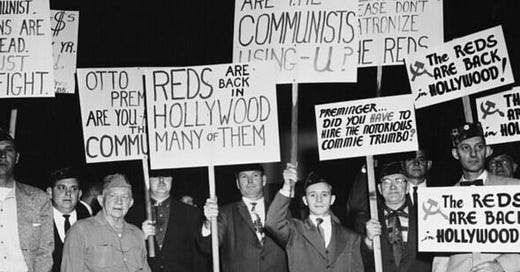Movies are a potent cultural force, shaping our imaginations and expectations. Social change isn’t reducible to incomes or material progress. It’s really about stories - our celebrated heroes and despised villains. Humans share a unique capacity for cultural learning: they share ideas, debate alternative visions of freedom and fairness, debunk what’s right and proper. Governments know this, and have sometimes sought to monopolise narratives through strict censorship.
State-persecution can be silencing. A stark example of this is McCarthyism, a period of intense anti-communist suspicion and persecution in the United States during the early 1950s. Named after Senator Joseph McCarthy, this era saw widespread accusations, blacklists, congressional hearings, and loyalty oaths.
During the anti-communist witch-hunt, the US House of Representatives formed an investigative body, ‘The House Un-American Activities Committee’ (HUAC) to root out private citizens, public employees and organisations with communist sympathies. In 1947, HUAC launched a major investigation into the motion picture industry, summoning 41 writers, directors and producers to testify about communism. Of these, 10 refused to cooperate and invoked the First Amendment. ‘The Hollywood Ten’ were legally convicted, sentenced to jail, and fired by their studios. Investigations were ramped up over the 1950s, Hollywood progressives were put on trial, and vilified.
How did repression affect artistic expression, industry dynamics, and political voting? To assess the effects of Hollywood blacklisting, Hui Ren Tan and Tianyi Wang have an awesome new NBER Working Paper, employing a suite of sophisticated econometric techniques! Honestly, it’s one of the best papers I’ve seen on politics and culture.








